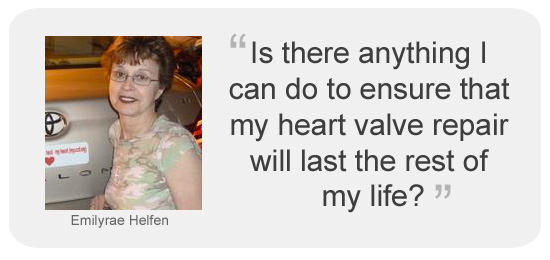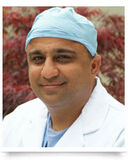Heart Valve Summit Video #8: “Is There Anything I Can Do To Ensure My Heart Valve Repair Will Last Forever?” asks Emilyrae
By Adam Pick on November 25, 2011
Recently, I received a great question from Emilyrae. She wrote, “Adam – I am a healthy person. I’m 68-years old and I just had a successful mitral valve repair. I’m curious to know, is there anything I can do to ensure that this repair will last the rest of my life?”

While at the Heart Valve Summit, I was fortunate to discuss Emilyrae’s question with Dr. Salenger, the Director of Valve Surgery at Good Samaritan Hospital in Suffern, New York. The video below contains the highlights of our discussion. (For the members of our community who are hearing impaired, I have provided a written transcript of this video below.)
Thanks to Emilyrae for her question and a special thanks to Dr. Rawn Salenger for taking the time to educate our community about this very important post-operative topic.
Keep on tickin!
Adam
P.S. Here is the interview transcript:
Adam: Hi. It’s Adam, and we are at the Heart Valve Summit in Chicago, Illinois, answering your questions that were posted at HeartValveBlog.com. I’m thrilled to be joined by Dr. Rawn Salenger, who’s the director of valve surgery at Good Samaritan Hospital in Suffern, New York. We have a question Dr. Salenger, from Emilyrae, and she writes in, “I am a healthy person, I’m 68 years old I just had a successful mitral valve repair. I’m curious to know, is there anything I can do to ensure that this repair will last the rest of my life?”
Dr. Salenger: Well Adam, first of all, thanks for having me, and letting me be a part of this. We get that question a lot. From people who have had successful surgery, both from valve repair patients, as well as valve replacement patients. There’s a lot of different kinds of valve surgery, but in very broad terms you can categorize it as either repair or replacement. There’s some similarities, and a few differences in what you should look for post-operatively, and there’s also, this is an area of intense study, that as surgeons, we are particularly interested in, and cardiologists, and there is a lot of unknown in this area; so there are things that we think may help. There’s not a lot that’s proven to help. The number one thing that we know has a huge impact on the durability of your repair or replacement is a good technical operation. So a lot of the advice that you give people about how to choose a surgeon and researching the operations that they are going to have will have a big impact on how long their valve or replacement lasts. We know that’s critical, but there’s also other factors unique to the patient that influence how long a replacement or repair will last. For replacements, for example, age is a big factor. We know that a valve prosthesis will last longer in older patients then in younger patients, and we think that has something to do with the hemodynamics in younger patients and the greater stress that is placed on the valves.
Some other areas, I broke it down in to about five areas that I think can affect post-operative longevity. The first two being good technical operation. The second one being age. The third one is a bit of a questions mark, but there is some evidence that, particularly for when you are putting a valve prosthesis in to somebody, that how calcified their native valve was may affect the long term, how long their valve prosthesis will last.
Adam: Not to interrupt you, by native valve you’re talking about the patient’s original valve…
Rawn Salenger, MD: Their own valve right, so if the valve was very diseased and calcified at the time of the operation, there are some studies to suggest that they may calcify their new valve more quickly. There is also some very exciting research being done about the genetics of valve disease in general, and this is an area, that as physicians, we don’t completely understand, but we are trying to understand better. There’s some exciting publications from the University of Pennsylvania about valve endothelium and how that affects the early stages of valve disease. And that may have implications on how we treat valves that we put in patients, and also for how we treat patients in the early stages of valve disease to avoid surgery all together. That’s a very exciting area, and one of the things we’ve learned so far is that, particularly for patients with aortic stenosis there’s some overlap in the disease process at the cellular level early on, and there may be some similarities between the diseases of aortic stenosis and coronary artery disease. So if we can identify those genetic factors, and then try to modify those, that may help us treat patients better. The fifth thing I thought about are things that probably gets more to the heart of the question that your patient and a lot of my patients are asking, which is what can I do after I’ve had a good operation to try to maximize my benefit, and this is really an area that we don’t have concrete things to tell patients, but we know things that can influence the heart in general and things that are healthy anyway that may influence the longevity of your repair or replacement. The first thing to understand is how do repairs fail? There’s two broad categories as to why repairs usually fail, either a breakdown of the valve repair itself or progression of the disease in the heart. Which can be either progression of disease in the heart itself, which basically means changing in the size of the heart that affects the valve or disease in the valve in itself, and this would have to do with the process that caused the valve to degenerate in the first place. For valve replacements, the most common reason that these fail is degeneration of the prosthesis that’s put in place, in particular we are talking about when we use tissue valves because for metal valves, a whole different story, those do not degenerate. Now if you are a patient, and you want to keep yourself healthy, basically if you can keep the heart healthy as far as size and function, you’re going to maximize your outcome of your heart surgery and your valve surgery. The number one thing to do as a patient is to see your cardiologist regularly, and get echocardiograms at regular intervals. An echocardiogram is an ultrasound that looks at the heart, and you need to also ask your physician about the echocardiogram. Don’t just get it and assume everything is fine. I would get the echocardiogram and ask your physician just a couple of simple questions. Ask them, “Is the heart size stable?”, “Is the function stable?”, “Is it improving after surgery?” And particularly for aortic stenosis patients, who may want to ask, “What is the thickness of the heart?” This is a good thing to do because it helps you know if you are making progress, and if you are not making progress, is there something that can be done? For example optimize your medical regiment. Even though you’ve had surgery, the disease hasn’t necessarily been cured, and there’s still an impact that medication can have in the future. Sometimes for physicians and patients, there’s a tendency if the patient feels well, not to change anything, and to some extend that’s a good idea, but sometimes you can really optimize people’s medical regiment, and even though they feel well they may benefit from either a new medication that’s been found to help or increasing the dose of a medication that they’re on. And this is something you may have to push your physician on, and ask them “Should my medications be changed?”, “Should my doses be changed?”. And you can use that question in conjunction with the results of your echocardiogram to decide if you are making progress, or maintaining the benefit of your valve repair. One example of that is blood pressure control. Overall in the country, only about half the people that have high blood pressure even know about it and high blood pressure is one of the most modifiable, strongly linked associations to cardiovascular disease. So only half of the people even know they have high blood pressure, and of the people that know they have high blood pressure, only about half are adequately controlled, so that is an example of something that is relatively simple that can be very effectively treated with medication changes. There are other medications that are being investigated to see if they help prolong the life, particularly of valves that have been replaced. These are things such as cholesterol lowering drugs, particularly things called statins and other agents that are used after stents, such as dual anti platelet therapy, are things that inhibit platelet aggregation on the surface of the valve. We don’t have enough information yet to say if they’re helpful, but those are areas of active investigation. Another thing you can do as a patient, to kind of maintain and improve the health of your heart, is to not smoke. It sounds obvious, but many patients who end up having heart surgery have smoked in the past, and a lot of patients quit, but not everybody does, and it’s just critical to quit smoking. Even though very difficult to do, it’s critically important to your future help. Other things you can do is control your weight. This will put less strain on your heart in general, and most likely put less strain on the function of your valve repair or your valve replacement. Part of this is eating a well-balanced diet, and getting moderate exercise. Recommended exercise is about 30 minutes a day 5 times a week. And you don’t have to be a marathon runner, as long as you are moving, you can just walk your dog or walk with friends, just keep moving for 30 minutes about 5 times a week. There have been studies that show that people that exercise regularly, even at that moderate level, over a long period of time maintain better tissue integrity than patients who have a sedentary lifestyle. Again, this is an area that we don’t completely understand, but it can help you maintain your health overall and your heart health very well. And then I think the final thing to keep in mind is more for replacements, is having good dentition because having infections in your mouth and having to deal with that can affect the valve and that can be a problematic situation. (To learn more about mitral valve repair, click here.)
Adam: Great. Well Dr. Rawn Salenger thanks so much for taking the time to think about Emily Ray’s question and really giving us a good dose, if you will, of great counsel and advice. I hoped that helped the patients and caregivers out there, again this is Dr. Salenger, the director of valve surgery at Good Samaritan Hospital in Suffern, New York. Thanks so much for being here.
Dr. Rawn Salenger, MD: Thanks Adam.
|
Lynda Knopf BS/RN says on November 25th, 2011 at 7:42 pm |
|
Dr.Rawn Salenger shared a very comprehensive summary with all post cardiac surgical patients, particularly regarding my interest-tissue valve replacements -He presented a WEALTH OF INFORMATION plus solid practical advice by recommending a protective general better life-style dealing with weight control,good nutrition and routine exercise-His honesty regarding so many” unknowns” was helpful towards a “reality check” on our individual expectations post valve replacements–We patients are extremely fortunate and grateful for our surgeons’ lifesaving skills and we continually thank you Adam for providing us with first hand information and support!!! |
 |
|
Bobbie says on November 27th, 2011 at 12:59 pm |
|
How often do valve repairs for regurgitation result in stenosis after surgery? That is my current problem. |
 |
|
Rawn Salenger says on January 13th, 2012 at 11:09 am |
|
Bobbie – This may be an under-appreciated problem post mitral repair. I would be curious to know if you have symptoms or if someone just did an echo and measured a (pressure) gradient across your valve. It is difficult to know the significance of a mild or moderate asymptomatic gradient post repair. I would also be curious to know what your mitral valve pathology is (what caused it to leak – eg. – rheumatic, myxomatous) and what size and type annuloplasty ring you had implanted. Dr. Rawn Salenger |
 |
|
John Myers says on March 10th, 2012 at 11:58 am |
|
I would be interested in seeing additional information on this topic. |
 |
|
Rawn Salenger says on May 18th, 2012 at 9:35 am |
|
Mr. Myers – any specific questions? |
 |












